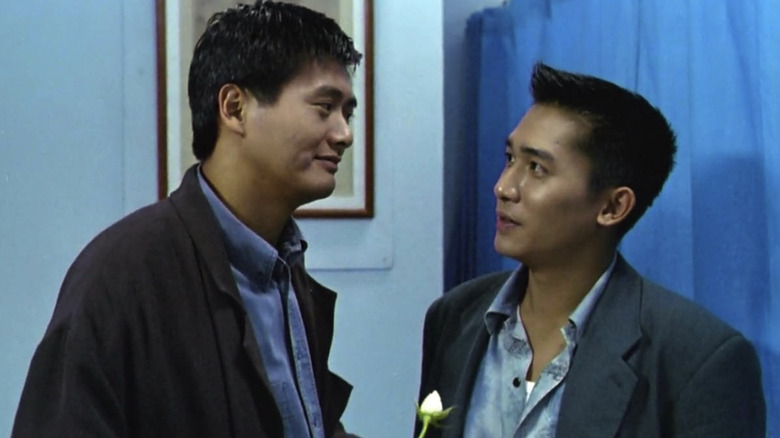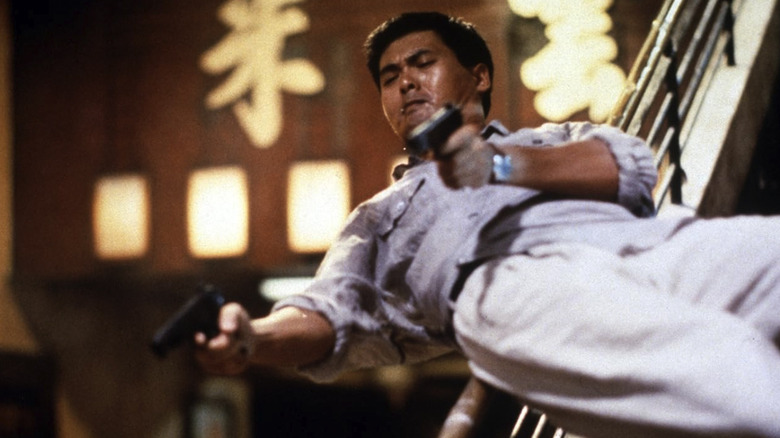John Wick Fans Need To Watch This Genre-Defining Crime Action Movie
Nobody does it like John Woo. Calling Woo a pioneering force that helped shape Hollywood action movies would be an understatement, as his influence runs deeper than one might imagine. It wouldn't be farfetched to call Woo's brand of cinematic violence poetic, where he revitalizes the mundane with slick gusto — whether it's when a hail of bullets pierces through shattered glass, or time slows down to highlight something impossibly cool.
Ever since Woo found mainstream success with 1986's "A Better Tomorrow," he has been experimenting with the action genre and how it expresses stylized violence in passionate bursts. That film brought together American gangster cinema and Hong Kong martial arts flicks in ways never done before, and once Woo cemented his status as one of the masters of the genre, countless action flicks (including "The Matrix") mimicked Woo's aesthetic time and again. More recent genre entries, like Chad Stahelski's "John Wick" movies and the freshly released "Ballerina," lovingly wear Woo's influence on their sleeve, incorporating frenetic "gun-fu" into dramatic stories about personal revenge. Woo's stylistic brilliance doesn't solely lie in artistic gunplay that substitutes for complex character motivations, but also in the intimate stand-offs that precede a fight, expressing much more than words ever can.
To better understand the aesthetic (and tonal) fabric of "John Wick" and its interquel "Ballerina," it's helpful to look back at Woo's "Hard Boiled," an astoundingly frenzied exploration of the jaded-detective-on-a-dangerous-mission trope. Woo takes a fairly straightforward premise and injects it with such palpable intensity that the film's emotional aspects hit harder because of the exaggerated action. Let's dive into the chaotic world of Inspector "Tequila" Yuen (Chow Yun-Fat), the beating heart of "Hard Boiled."
A big chunk of our favorite action flicks wouldn't exist without Hard Boiled
"Hard Boiled" begins with a stake-out at a Hong Kong teahouse, where Tequila and his longtime partner Benny (Bowie Lam) surveil a gang of gun smugglers. The inevitable happens when a shootout triggered by a rival gang ensues, leading to the deaths of several officers (including Benny) and some civilians. Woo sets the stage for a gritty revenge arc, but Tequila is not alone in this tumultuous journey — undercover cop/hitman Alan (Tony Leung) has his back, and nothing can stand in their way. As the bodies start piling up, Tequila unravels as a hardened, no-nonsense protagonist whose love for jazz and irreverence for rules flesh out the kind of person he is. While his cynicism is expressed through his alcoholic tendencies, there's also a streak of fierce protectiveness towards those who remain blameless.
The gun-fu in "Hardboiled" is streamlined to destroy backdrops in bustling cityscapes, where massive buildings are reduced to rubble in the face of opposing forces clashing for dominance. This collateral damage doesn't include human lives, of course, as realism is the last thing Woo's concerned with here, and for good reason. When explosives go off and the characters alternate between bullets and a hand-to-hand skirmish, we root for Tequila's cause more than ever, as this choreographed violence and collateral destruction becomes a manifestation of his righteous anger.
"Hard Boiled" doesn't indulge too much in the emotional interiority of its protagonist like "John Wick" does, but this restrained approach works for several reasons. For starters, Tequila's badassery as a man avenging his partner is supplemented by a perpetual cloud of impending doom, as Woo leans pretty heavily into imagery that underlines the regrets of the characters. Even the charged Tequila-Alan dynamic isn't tonally unblemished, as their mutual respect is tinged with a sliver of distrust, where they work together while being wary of the other. Even the ending doesn't escape this bittersweetness, as there's no true happiness in a hellish underbelly overrun with corruption.
While "Hard Boiled" earnestly roots for its heroes, it frames their victories as Pyrrhic. In the end, only a sense of resigned futility remains, alongside the dozens of films inspired by Woo's classic that came in its wake.

